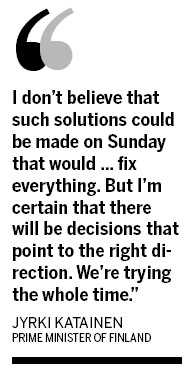Germany, France split as summit approaches
Eurozone leaders to meet during weekend to break deadlock
PARIS / FRANKFURT - Plans to tackle the eurozone debt crisis have stalled with Paris and Berlin at odds over how to increase the firepower of the region's bailout fund, French President Nicolas Sarkozy said on Wednesday.
Sarkozy told French lawmakers the dispute was holding up negotiations and flew to Frankfurt to talk with German Chancellor Angela Merkel in an attempt to break the deadlock ahead of a make-or-break European leaders' summit on Sunday.
The two leaders left that meeting without speaking to waiting reporters.
Asked if a deal had been reached, Jean-Claude Juncker, chairman of the Eurogroup of eurozone finance ministers who attended the evening meeting, said: "We're still in meetings Saturday, Sunday."
Divided over leverage
France has argued the most effective way of leveraging the European Financial Stability Facility (EFSF) is to turn it into a bank, which could then access funding from the European Central Bank (ECB), but both the central bank and the German government have opposed this.
"In Germany, the coalition is divided on this issue. It is not just Angela Merkel whom we need to convince," Sarkozy told the parliamentarians at a lunch meeting, according to Charles de Courson, one of the legislators present.
His comments fueled doubts about whether eurozone leaders will agree on a clear and convincing plan when they meet on Sunday.
Failure to do so would further undermine financial markets' already shattered confidence in the currency bloc and its ability to get on top of a two-year-long debt crisis, which threatens the long-term viability of the single currency.
Adding to uncertainty, the Financial Times reported that plans to strengthen the banking system, another key plank of the discussions, would fall short of market expectations.
The latest official estimates have put the banks capital shortfall at less than 100 billion euros ($137.4 billion), the FT said, compared with a recent report by the International Monetary Fund, which put the funding hole at 200 billion euros, and analysts' estimates of 275 billion euros or more.
Managing expectations

Finland's Prime Minister, Jyrki Katainen, added his voice to what appeared to be efforts to lower expectations, telling public broadcaster YLE he did not believe Sunday's summit would resolve the eurozone debt crisis.
"I don't believe that such solutions could be made on Sunday that would ... fix everything. But I'm certain that there will be decisions that point to the right direction," he said in comments broadcast on Wednesday.
"We're trying the whole time," said EU Economic and Monetary Affairs Commissioner Olli Rehn after the Merkel-Sarkozy meeting, when asked about the chances of reaching a deal at the weekend summit.
Nevertheless, the hope remains that leaders will agree on new steps to reduce Greece's debt, strengthen the capital of banks with exposure to troubled eurozone sovereigns and leverage the eurozone's rescue fund to stem contagion to bigger economies.
"You know the French position and we are sticking to it. We think that clearly the best solution is that the fund has a banking license with the central bank, but everyone knows about the reticence of the central bank," French Finance Minister Francois Baroin told reporters in Frankfurt.
"Everyone also knows about the Germans' reticence. But for us that remains ... the most effective solution."
A senior German government source said Berlin remained resolutely opposed to the ECB backstopping the rescue fund.
Bank or insurer?
Eurozone officials have told Reuters that an alternative model, whereby the EFSF could underwrite a portion of newly issued eurozone debt, is also on the table.
By guaranteeing the first 20 to 30 percent of any losses, the EFSF could stretch three to five times further. With about 300 billion euros of its 440-billion-euro capacity still available, the fund could be expanded to more than 1 trillion euros, and give markets pause for thought.
However, analysts are not convinced that a leverage plan involving a guarantee on first losses would succeed, warning that it could create a two-tier structure in some bond markets and would be meaningless without an explicit commitment from the ECB to go on buying at-risk debt.
"On paper this solution has some merits because it is expedient ... but is in fact fraught with complications that are very likely to make it fail," Shahin Vallee, an analyst with Bruegel, a leading think tank, said in a research paper.
As well as trying to strengthen the rescue fund, eurozone leaders are racing to convince banks to accept "voluntary" write-downs of up to 50 percent on their Greek sovereign holdings.
Greece remains mired in recession and its overall debt is forecast to climb to 357 billion euros this year, or 162 percent of annual economic output - which few economists believe can be paid back.
Reuters


















